2023 Toyota 4Runner Repair, Service & Tires
Get Started
Complete Auto Care for Your 2023 Toyota 4Runner
-
TIRES FOR YOUR 2023 Toyota 4Runner View Tire Info GET TIRE PRICING
-
REPAIR FOR YOUR 2023 Toyota 4Runner View Repair Info SCHEDULE REPAIR
-
MAINTENANCE FOR YOUR 2023 Toyota 4Runner View Maintenance Info SCHEDULE MAINTENANCE
-
OFFERS FOR YOUR 2023 Toyota 4Runner Limited Time Tire Offers VIEW ALL COUPONS
2023 Toyota 4Runner Tires
Recommended Tires | Tire Information
2023 Toyota 4Runner Tires Sizes, Speed Ratings, and Inflation
Not sure about your 2023 Toyota 4Runner tire size? Use the following chart to find information on tire size, speed rating, and inflation.
| Trim Level | Speed Rating | Inflation in PSI F/R | Tire Size |
|---|---|---|---|
| 2023 Toyota 4Runner TRD Off-Road | S | 32 PSI/32 PSI | P265/70R17 |
| 2023 Toyota 4Runner TRD Pro | S | 32 PSI/32 PSI | P265/70R17 |
| 2023 Toyota 4Runner TRD Sport | H | 32 PSI/32 PSI | P245/60R20 |
| 2023 Toyota 4Runner TRD Off-Road Premium | S | 32 PSI/32 PSI | P265/70R17 |
| 2023 Toyota 4Runner Limited | H | 32 PSI/32 PSI | P245/60R20 |
| 2023 Toyota 4Runner 40th Anniversary Edition | S | 32 PSI/32 PSI | P265/70R17 |
| 2023 Toyota 4Runner SR5 Premium | S | 32 PSI/32 PSI | P265/70R17 |
| 2023 Toyota 4Runner SR5 | S | 32 PSI/32 PSI | P265/70R17 |
|
2023 Toyota 4Runner TRD Off-Road Speed Rating: S Inflation F/R: 32 PSI/32 PSI |
|
2023 Toyota 4Runner TRD Pro Speed Rating: S Inflation F/R: 32 PSI/32 PSI |
|
2023 Toyota 4Runner TRD Sport Speed Rating: H Inflation F/R: 32 PSI/32 PSI |
|
2023 Toyota 4Runner TRD Off-Road Premium Speed Rating: S Inflation F/R: 32 PSI/32 PSI |
|
2023 Toyota 4Runner Limited Speed Rating: H Inflation F/R: 32 PSI/32 PSI |
|
2023 Toyota 4Runner 40th Anniversary Edition Speed Rating: S Inflation F/R: 32 PSI/32 PSI |
|
2023 Toyota 4Runner SR5 Premium Speed Rating: S Inflation F/R: 32 PSI/32 PSI |
|
2023 Toyota 4Runner SR5 Speed Rating: S Inflation F/R: 32 PSI/32 PSI |
* Note: these models have different tire sizes depending on vehicle options.
Recommended Tires for Your 2023 Toyota 4Runner
What tires are best for a 2023 Toyota 4Runner? Check out the following tire brands and types.
 ALENZA AS ULTRA
ALENZA AS ULTRA
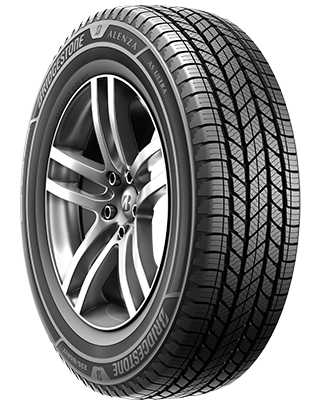
- No warranty
- All-Season
- Light Truck Tires
 Dueler H/T 684 II
Dueler H/T 684 II
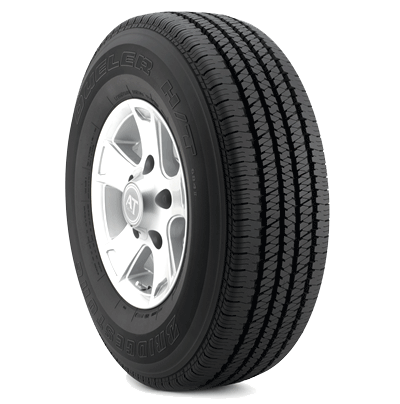
- Platinum Pact Limited Warranty
- All-Season
- Light Truck Tires
 Blizzak DM-V2
Blizzak DM-V2
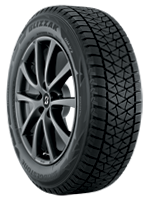
- No warranty
- Winter
- Winter
 Dueler A/T Revo 3
Dueler A/T Revo 3
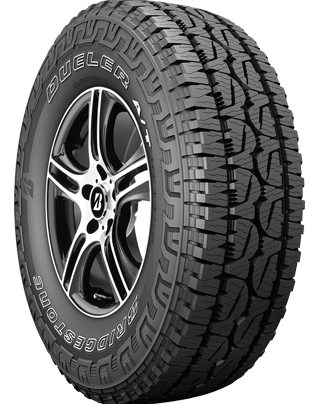
- Platinum Pact Limited Warranty
- All-Season
- Light Truck Tires
 Dueler A/T Revo 3 - LT
Dueler A/T Revo 3 - LT
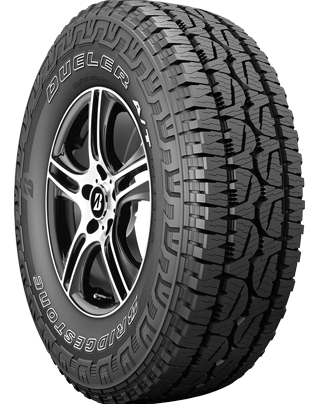
- Platinum Pact Limited Warranty
- All-Season
- Light Truck Tires
 Dueler A/T RH-S
Dueler A/T RH-S
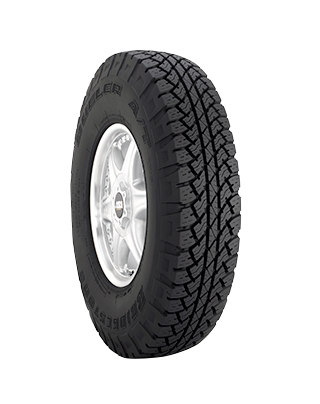
- Platinum Pact Limited Warranty
- All-Season
- Light Truck Tires
 Destination A/T2
Destination A/T2
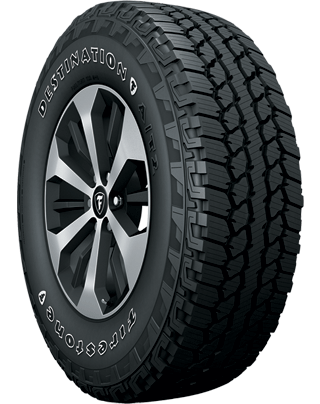
- Gold Pledge Limited Warranty
- All-Season
- Light Truck Tires
 Destination LE3
Destination LE3
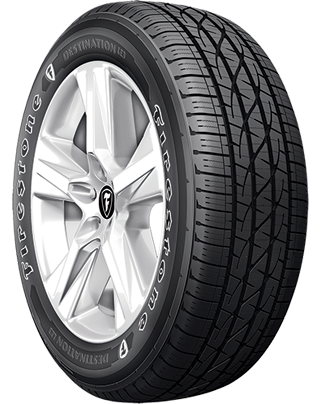
- No warranty
- All-Season
- Light Truck Tires
 Destination X/T
Destination X/T
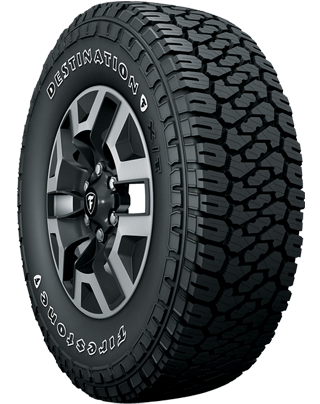
- Gold Pledge Limited Warranty
- All-Season
- Light Truck Tires
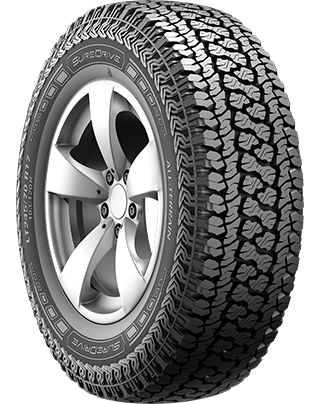
- No warranty
- All-Season
- Light Truck Tires
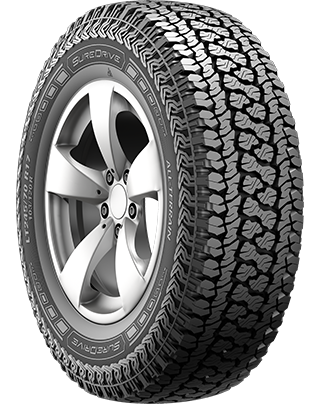
- No warranty
- All-Season
- Light Truck Tires
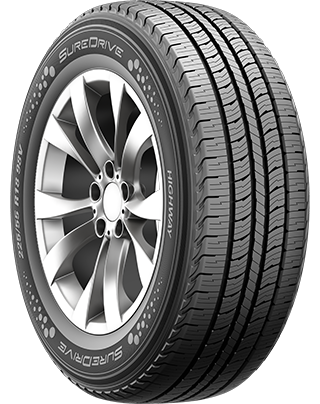
- No warranty
- All-Season
- Light Truck Tires
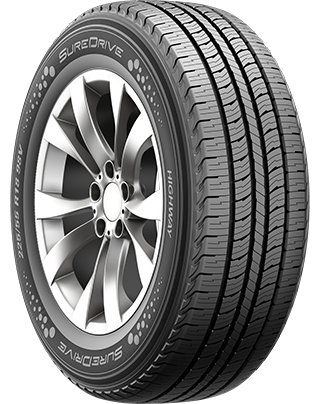
- No warranty
- All-Season
- Light Truck Tires
 OPEN COUNTRY A/T III
OPEN COUNTRY A/T III
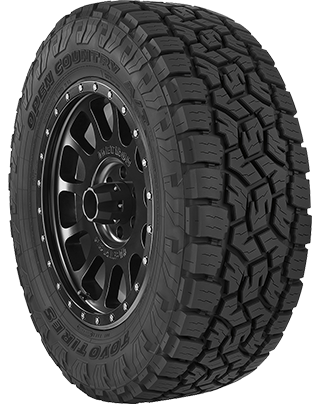
- No warranty
- All-Season
- Light Truck Tires
About 2023 Toyota 4Runner Tires
Beyond the correct tire size, you also want to consider a handful of other factors when buying new Toyota 4Runner tires like which tire brands you like most and where you drive. Think about where you live (countryside vs. city vs. mountains) and the kind of unexpected weather you're likely to experience when evaluating your driving conditions. Drivers in states that fully experience all four seasons often buy two sets of tires: one set for winter, one set for summer. Other drivers prefer the convenience of all-season tires. They make one trip to the tire shop and they're pretty much ready for rain, light snow, or sun!
Driving style is next on the list to think about when buying tires. If you're an avid off-roader who yearns to pioneer new paths, you have very different tire needs than a highway commuter who doesn't hit the hills very often. Talk to a tire technician at Firestone Complete Auto Care for help choosing the best tire for you, or start shopping for Toyota 4Runner tires online.
Toyota 4Runner Installation and More
Firestone Complete Auto Care has been a leading tire provider for more than a century. We're a tire store that also offers professional tire installation, maintenance, and rotation, along with complete auto care. Shop 2023 Toyota 4Runner tires online and schedule an installation appointment.
Questions About 2023 Toyota 4Runner Tires
-
Is Toyota tire inflation important? The right tire pressure can make all the difference. Proper tire inflation helps increase fuel economy, improve braking time, and boost tire lifespan! Even a small change in tire pressure can impact your driving.
-
What do the numbers on my Toyota 4Runner tires mean? The numbers on your tire sidewall give you information about tire speed rating, traction, treadwear, tire size, and load carrying capacity. Chat with a tire technician to learn how to read the numbers on your Toyota tires!
-
How do I check the tread depth on my Toyota tires? Stay on top of your tire tread depth to help avoid a dangerous drive. You can check tread depth with a penny. Hold the penny so that Abraham Lincoln is facing you, then place your penny into a tread groove upside down. If you can see the top of Abe’s head, your tread is shallow and it might be time for new Toyota 4Runner tires. Grab a penny. Hold the so that Abe Lincon's head is facing you and his hair is pointing toward the ground. Then, place the penny into a tread groove. If you can see the top of Abe’s head, your tread is shallow and it might be time for new Toyota 4Runner tires.
Types of 2023 Toyota 4Runner Repairs
How do I learn more about auto repairs? Click on a service below to read about the types of Toyota 4Runner repairs we do at Firestone Complete Auto Care.
2023 Toyota 4Runner Repair Information
Car repairs: for many drivers, that phrase is a dreadful one. But at Firestone Complete Auto Care, we strive to give you the excellent repair experience you deserve. Bring your 2023 Toyota 4Runner in for repair services and our skilled repair technicians will get your 4Runner back on the road. We'll work to evaluate the scope of repairs needed and explain your options. We value your trust, so we recommend only the repairs we think are necessary for your safety on the road.
How Much Are Toyota 4Runner Repairs?
Several factors can affect the cost to repair your 2023 Toyota 4Runner, including what kind of repair you need, the cost of any replacement parts, the labor involved, and your locale. They're updated regularly!
A few different aspects can influence repair costs for your 2023 Toyota 4Runner, like
Questions About 2023 Toyota 4Runner Auto Repairs
-
Do I still need scheduled maintenance even when nothing is wrong with my Toyota? One of the best ways to prevent 2023 Toyota 4Runner repairs is by staying on top of your Toyota maintenance schedule. This schedule is written by the people who made your vehicle and they know best how to keep it running smoothly.
-
What's wrong if something feels 'off' in my Toyota? You know your vehicle. You also know when something feels 'off' with your vehicle. Pay attention when things don't run like they used to and stop by for a Courtesy Check when you notice an unusual sign, smell, or sensation. We might be able to help you prevent Toyota 4Runner repairs!
-
Do I have to get the repairs you recommend for my Toyota? We won’t recommend a service or repair for your 2023 Toyota 4Runner unless we think it’s necessary to keep you safe. Want to know more about a specific recommended repair? Ask! We’re here to help.
Get Your 2023 Toyota 4Runner Brakes Fixed
Your Toyota 4Runner engine may be strong and reliable. But if you can’t stop it, it’s as good as scrap metal. If you’re experiencing squeaky brakes or a loss of braking power, don’t wait! Safe driving is difficult when your brakes are anything but their best. What's more, waiting for things to figure themselves out can result in more damage to your brakes and your wallet. Get your 2023 Toyota 4Runner brakes fixed at Firestone Complete Auto Care. We offer many affordable brake repairs like brake pad/shoe replacement, brake rotor/drum machining, brake fluid exchange, and brake caliper and wheel cylinder service.
Answers to Your 4Runner Brakes Questions
-
Why is my 4Runner shaking as I brake? Feeling shaking or vibrating in your 4Runner as you brake might indicate a few different problems, including worn brake pads or rotors, loose suspension components, damaged brake calipers, or warped rotors. Book an appointment for a free brake inspection as soon as you notice a problem with your brakes.
-
How long should my 4Runner brake pads last? You can usually get around 30,000 to 40,000 miles out of your brake pads, but how and where you drive your 4Runner can affect this. Hauling large loads or riding your brakes can shorten their lifespan, while smoothly braking and mostly sticking to highways can help your brake pads last longer.
-
Does brake fluid leak when the car is off? Your 4Runner has a closed hydraulic brake system, meaning you should not have a brake fluid leak under normal conditions. However, parts of your brake system can wear out over time or become damaged, which can lead to a brake fluid leak.
Repairing Your Toyota 4Runner Drivetrain
You don't want to go to just anyone for drivetrain repair. Drivetrains for front, rear, and all-wheel-drive and 4WD vehicles are all different. You want to visit Firestone Complete Auto Care. We can help repair all of your 2023 Toyota 4Runner drivetrain components Your Toyota 4Runner may need driveshaft attention if you feel heavy vibrations in your floorboards, clunks when shifting, resistance when turning, or vibration as your vehicle accelerates.
Questions About 2023 Toyota 4Runner
-
How do I know if my Toyota drivetrain is damaged? Noises toward the back of your Toyota 4Runner, leaking fluid, trouble turning — these could all be signs of drivetrain damage you want to address. Take action before something more severe happens.
-
Why is my 4Runner malfunction indicator light (MIL) on? Engine problems, transmission problems, faulty sensors, electrical issues, misfire issues, and connector problems could all cause your 4Runner’s malfunction warning light, or better known as the check engine light, to illuminate.
-
Is a drivetrain malfunction in my 4Runner serious? If your 4Runner has a drivetrain malfunction, don't wait. Get it checked out by a professional mechanic. Identifying the underlying cause and performing the appropriate repairs right away can help prevent further damage and avoid unsafe driving conditions.
2023 Toyota 4Runner Wheel Alignment
Alignment services involve precise adjustments to your Toyota 4Runner’s suspension system, the connection between the vehicle and the wheels. When your car has an alignment service, the individual angles of your tires are adjusted so that they come into contact with the road in just the right way — the way Toyota intended them to. When you bring in your 2023 Toyota 4Runner, we’ll perform an alignment check first. After that, we can adjust your wheel alignment angles until they match Toyota’s recommended measurements.
Toyota 4Runner Alignment Questions
-
Are there road conditions that can hurt my Toyota 4Runner alignment? Potholes and uneven roads can knock your car out of alignment, so stay aware of the road ahead and adjust your speed (or avoid these obstacles whenever it’s safely possible).
-
How frequently should you get a wheel alignment for your 4Runner? Check your 4Runner owner's manual for Toyota's recommended interval. It's generally a good idea to check your alignment every 6,000 miles or 6 months, depending on which comes first.
-
Do you need an alignment with new 4Runner tires? It’s likely not a requirement to get an alignment when you install new tires on your 4Runner, but it's a smart idea to do so anyway. An alignment can help ensure even tire wear, smooth handling, and better fuel efficiency.
2023 Toyota 4Runner Engine Services
If your 2023 4Runner engine needs repairs, our technicians will provide you with a thorough explanation beforehand. We make recommendations, but you make the final decision. If a repair can wait, we'll let you know. But if immediate repairs are necessary for your safety, we’ll make sure that's clear, too. We want to provide you with the information you need to make an informed engine repair decision. By choosing Firestone Complete Auto Care for 4Runner engine repairs and you can feel good knowing that we only use Toyota-compliant replacement parts such as the cambelt, valve guide seal, ignition coil, or a different component.
Questions About 2023 Toyota 4Runner Engines
-
Why does the check engine light come on when I start my 4Runner? It's okay if your check engine light comes on when you first start your vehicle. This is a sign that your vehicle is testing its circuits. The light should go off shortly. Bring your vehicle in if it doesn't.
-
Why does my Toyota engine sound different? Strange under-the-hood noises can point to problems within your Toyota 4Runner engine. Tapping or knocking could mean you need an oil change. Whistling sounds could mean you have an intake leak or misaligned belt. Squealing may be caused by a loose fan belt, and grinding could be a sign that something is wrong with your brakes — not the engine.
-
What could damage my Toyota 4Runner engine? Some driving habits are not so great for your engine. These include driving on a near-empty gas tank, flooring the gas pedal while the car is in Park, or accelerating too quickly, too soon. Protect your engine’s performance and efficiency by distancing yourself from these habits.
Get Your Toyota 4Runner Tire Repaired
If your 2023 Toyota 4Runner is in need of a tire inspection or possible flat tire repair, Firestone Complete Auto Care has your back. Our tire technicians can determine whether it's safe to plug and patch the tire, or whether it needs to be replaced. To start, we’ll consider the location of tire damage, the type of issue, the size and scope of the damage, and the amount of wear on your tires.
If we determine that your 2023 Toyota 4Runner tire can be safely repaired, the repair process is actually fairly simple: (1) Take the tire off the wheel for easy inspection, (2) fill in the area that’s been punctured to prevent damage from moisture, and (3) secure and seal the inner tire liner to ensure the tire is airtight.
Toyota 4Runner Tire Repair Questions
-
Can I drive my Toyota on a flat tire? A flat tire that’s not addressed can take a terrible toll on the rest of your car. Until you have it repaired or replaced, drive your 4Runner as little as possible to reduce your risk of damage to the wheels and alignment – or further damage to that already struggling tire!
-
Will a temporary sealant fix my Toyota's flat tire? Temporary sealants will solve your problem… for a little bit. If you’ve seen temporary or emergency tire sealant before (it usually comes in a can), it can be tempting to turn to this as a solution for your flat tire. Keep in mind that these fixes could buy you some time to get to Firestone Complete Auto Care for a proper repair, but they could also cause some harm in the process (for example, damage to your TPMS). Plus, using a product like this could void your tire warranty.
-
What can cause 4Runner tires to keep losing air? Tire punctures, damaged wheels, and leaking valve stems are possible reasons for your 4Runner tires continuously losing air.
Maintenance for Your 2023 Toyota 4Runner
When it comes to your Toyota 4Runner, how you treat your car makes all the difference in its performance. With proactive maintenance, your 4Runner could be on the road well past the 200,000 mile mark.
2023 Toyota 4Runner Maintenance Schedule
What is the manufacturer recommended maintenance schedule for a 2023 Toyota 4Runner? Find maintenance info for your vehicle.
Guide to 2023 Toyota 4Runner Scheduled Maintenance
Instead of waiting for an issue to arise with your 4Runner, you can stay ahead of problems before they even begin. It’s as easy as following the recommended maintenance schedule that’s been written specifically for your 2023 Toyota 4Runner! This recommended maintenance schedule is written by the auto manufacturer, Toyota themselves. Driving conditions, climate variations, and other variables can affect which scheduled maintenance services you’ll need; however, recommended maintenance usually includes services like tire rotations, vital fluid checks/exchanges, filter changes, brake pad replacement, and oil changes. Scheduling routine service appointments is one of the best ways to help extend your 4Runner's life, increase your vehicle safety, and maybe even save you the headache of dealing with common 2023 Toyota 4Runner problems in the future.
Overview of Essential Toyota 4Runner Maintenance Needs
Head to your nearest Firestone Complete Auto Care in your 2023 Toyota 4Runner for factory-recommended routine maintenance and an expert technician will begin by performing a Courtesy Check. The Courtesy Check helps us see what we’re working with under the hood, and allows us to alert you to any potential problems before they worsen. Each Courtesy Check includes a free battery test and an inspection of your 4Runner's windshield wiper blades, head and tail lights, filters, fluid levels, tires, and alignment.
Firestone Complete Auto Care is your spot for 2023 Toyota 4Runner maintenance. Don’t wait until something goes wrong with your car. Visit your nearest location for proactive maintenance today.
2023 Toyota 4Runner Maintenance Questions
-
What should I do after hitting a pothole in my Toyota 4Runner? You know your Toyota 4Runner better than anyone else, so you’ll know if something doesn’t feel right while driving. Have your alignment checked (and adjusted if necessary) as soon as you notice a pulling steering wheel to prevent suspension damage or uneven tire wear.
-
When does my Toyota 4Runner need high mileage oil? Do you have more than 75,000 miles on your Toyota 4Runner? If so, request to switch to high mileage oil at your next oil change. This type of oil is specially formulated to keep aging engine parts in the best possible condition.
-
Can Toyota dashboard warning lights wait? Don't ignore dashboard warning lights! Bring your Toyota 4Runner in for a diagnostic code scan as soon as a dashboard warning light flashes on, whether it's your check engine or battery light. Dashboard lights alert you to trouble under the hood.
2023 Toyota 4Runner Battery Replacement & Size
Need more info about Toyota 4Runner batteries?
| Battery | Engine | Warranty | Cold Cranking Amps | |
|---|---|---|---|---|
| 24F-3 | V6/4.0L | Replacement 24 months | Performance months | 650 |
| 24F-6 | V6/4.0L | Replacement 36 months | Performance months | 750 |
| 24F-RP | V6/4.0L | Replacement 48 months | Performance months | 750 |
Car Batteries for 2023 Toyota 4Runner
Generally, car batteries last from three to five years. You want to replace your 2023 Toyota 4Runner battery before it fails and leaves you stranded. Watch for signs that your current battery is getting too old or too weak. A sluggish engine start, an illuminated battery or check engine light, bloated battery case, corrosion-covered posts, and subpar electrical performance may all indicate that your battery is waving goodbye.
Plus, at Firestone Complete Auto Care, we’ll test your battery for free. Drop in for a free battery check and, if needed, get your Toyota 4Runner a replacement battery. Car batteries are only one of our many strong suits. Our technicians are well-acquainted with Toyota’s service specs for 4Runner car batteries’ reserve capacities and cold cranking amps. Get help choosing the battery size that fits your car perfectly, and schedule a fast car battery replacement at your earliest convenience.
Commonly Asked Toyota 4Runner Battery Questions
-
Why doesn’t my Toyota 4Runner battery stay charged? A battery is in its final hour when it will no longer hold a charge. The battery may be too old. Or, you may have been leaving your car doors ajar and the cabin light at night. Stop by for a complimentary battery check at your favorite Firestone Complete Auto Care and get a handle on your car battery’s health.
-
What is the average lifespan of a car battery? The typical 12-volt car battery may last three to five years, depending on the type of battery, the driving conditions, and how well the battery is maintained.
-
Why is there white, crusty buildup on my 4Runner’s battery post? The white, flaky stuff that can build up around your 4Runner’s battery terminals is known as corrosion. Acid leaking from your vehicle’s battery post can have a chemical reaction with the air, leading to an accumulation of the white, powdery substance over time. Corrosion can affect the flow of electricity between your battery and the electrical system in your 4Runner, possibly causing issues with electrical performance and starting. If left unaddressed for long enough, it may even cause your battery to prematurely fail.
2023 Toyota 4Runner Oil Changes
Toyota recommends having your 2023 Toyota 4Runner’s motor oil changed at regular intervals. Your 4Runner may need an oil change right away if your check engine/oil change light is on, you hear knock knock knock coming from the engine, smell oil inside the car, or notice excess vehicle exhaust. You may also need an oil change more frequently than Toyota recommends if you haul heavy loads, drive in dusty areas, go off-roading a lot, or go long distances at low speeds.
Whether it’s synthetic, conventional, or a blend of both — your local Firestone Complete Auto Care has the right oil for your Toyota 4Runner. Consult Toyota's recommendations to select the right 2023 4Runner oil and talk with a teammate to learn more about our oil options: Quaker State® Advanced Durability™ conventional oil, Pennzoil® High Mileage Vehicle® motor oil, Pennzoil Platinum® Full Synthetic motor oil with PurePlus™ Technology, and Shell Rotella® heavy-duty engine oil. In an oil change service, one of our techs will change your 4Runner’s oil, replace and recycle the old oil and filter, inspect the rest of your car’s filters, top-off important fluids, and perform a courtesy inspection on your entire vehicle. Get professional engine care by making an oil change appointment for your 4Runner today.
Oil Change Q&A for Your 2023 Toyota 4Runner
-
Why is the oil light on in my Toyota 4Runner? Your Toyota 4Runner oil change reminder light might illuminate if it’s been too long since your last oil change. On the other hand, the oil pressure light might illuminate due to a clogged oil filter, a faulty oil pressure sensor, low engine oil levels, or a malfunctioning oil pump.
-
Can I change my Toyota oil on my own? Changing your own oil isn't as convenient as you might think. It requires special tools and old oil must be disposed of properly. Having your oil professionally changed reduces the chances of something going wrong with the oil change, but also with your vehicle down the road.
-
Why is my Toyota 4Runner exhaust smoke grayish or blue? You could have an oil leak and have a case of burning oil. Looks like it’s time for a professional to take a look. The leak could be the result of worn valve seals, fried piston rings, or old cylinder walls.
Engine Tune-Up Service for Your 2023 Toyota 4Runner
Regular engine tune-ups can optimize your 4Runner’s power on the road. Your nearest Firestone Complete Auto Care location has several options to choose from when it comes to Toyota 4Runner engine tune-up services. One option is the standard Firestone Tune-Up. This includes the installation of new spark plugs and a visual inspection of your engine’s components, plus a lifetime warranty on parts*. The second service focuses on your 4Runner's filters, specifically replacing the air filter and fuel filter. Our third service is a thorough cleaning of the fuel system. During this type of tune-up, we use a three-step process to get rid of harmful varnish, dirt, and carbon deposit buildup in your 4Runner’s fuel injectors, throttle body, and throttle plate. The result? Restored fuel system performance. Keep in mind that your 4Runner's mileage and maintenance history can uniquely impact its tune-up needs. Ask one of our technicians what your vehicle needs, based on your driving habits and your car’s current condition.
*Check with a teammate at Firestone Complete Auto Care for complete terms and conditions regarding warranties.
Common Engine Tune-Up Q&A for 2023 Toyota 4Runner
-
What happens if my Toyota 4Runner spark plugs fail? When it’s time to replace the spark plugs, don’t delay. These small (but vital!) parts provide the electric spark that your car needs in order to start, and old spark plugs can prevent your car from starting at all. Replace spark plugs on time or about every 30,000 miles or so.
-
What does a puddle underneath my Toyota 4Runner mean? Puddles could indicate that your vehicle is leaking coolant, oil, or brake fluid. Ignoring these leaks can lead to permanent engine damage, so address these symptoms ASAP with a tune-up service.
-
How frequently do the fuel injectors in my Toyota 4Runner need to be cleaned? The frequency at which car fuel injectors should be cleaned can vary depending on several factors, including the type of fuel used and the driving conditions. Some manufacturers generally recommend a fuel system cleaning as part of your general car maintenance, or as needed based on symptoms of poor fuel system performance.
2023 Toyota 4Runner Suspension Service & Repair
When you first drove your 2023 Toyota 4Runner, you probably enjoyed a smooth and steady ride. Now, however, things are starting to feel a little rough. Perhaps your 4Runner feels bouncy, leans to one side, or makes an unusual noise when going over a speed bump. The first sign of problems is a good time to bring your 2023 Toyota 4Runner in for steering and suspension repairs. We'll get to the root of the problem and, if steering and suspension service is needed, we'll explain all of your options and the potential cost.
Questions About 2023 Toyota 4Runner Steering & Suspension
-
What can cause my Toyota 4Runner to have a bouncy ride? Excessive bouncing in your Toyota 4Runner might be due to damaged struts or shocks that are unable to absorb road bumps effectively, causing your vehicle to feel more like a pogo stick than a smooth ride.
-
What can cause the front end of my 4Runner to dip forward when I apply the brakes? The forward momentum and weight transfer to the front wheels during braking can cause your 4Runner's front end to dip forward. A damaged or faulty suspension system may fail to distribute the weight and force effectively, causing the front end to dip even more.
-
What role do tire pressure and tread depth play in my Toyota's suspension? Keeping your tires properly inflated can help reduce strain on the suspension, and also help you notice when you need new tires. A tire that doesn't have an adequate amount of tread can't grip the road or function as well as the manufacturer intended.
2023 Toyota 4Runner A/C Service Near You
Our trained technicians will do what they can to solve your 2023 Toyota 4Runner A/C problems. During this initial A/C performance check, we’ll look at the state of your 2023 Toyota 4Runner’s A/C system to evaluate what repairs are necessary (if any). This check includes a visual inspection, performance test, and pressure and leak test.
While your 2023 Toyota 4Runner’s air conditioner is being serviced, we’ll also do an A/C evacuation and recharge. To start this process, a technician will flush out the old refrigerant from your vehicle’s A/C system. Then, they’ll perform an evacuation (also known as a discharge) on the entire system per Toyota guidelines. The A/C system is recharged with new refrigerant.
Questions About 2023 Toyota 4Runner A/C Systems
-
Why do I get hot air from my 4Runner A/C? Maybe your A/C starts cool but then gets warm. Or maybe it never gets cold in the first place. Either way, your A/C troubles could be traced back to a clogged expansion valve, faulty compressor clutch, blown fuse, or leak.
-
What causes A/C system leaks? Over the years, the rubber seals and gaskets in your 4Runner’s A/C system naturally degrade. Moisture can get into the system and cause a malfunction, or parts can simply wear out so that your system no longer seals properly.
-
Why does my 4Runner’s A/C only work when the car is moving? A problem with one or more of your air conditioning or electrical system components could cause the A/C to only work when your 4Runner is moving. You may be low on refrigerant, or the cooling fan could be faulty.
2023 Toyota 4Runner Transmission Service & Repairs
Your transmission carries power from the engine to the wheels so that you can drive at the speed you desire. Because of the transmission’s responsibility to translate the right dose of power into the right amount of speed, a small transmission issue can put a big dent in your 4Runner’s performance. 2023 Toyota 4Runner transmission problems can show up as shifting delays, grinding when accelerating, the car shaking at any speed, or whistling noises and a burning smell coming from under the hood. If you don’t pay attention to Toyota 4Runner transmission trouble your could suffer a loss in fuel efficiency or discover that your 4Runner’s not even driveable. Our expert techs are familiar with 2023 4Runner services and perform them according to Toyota-recommended specifications. Schedule an appointment at your local Firestone Complete Auto Care at the first sign of transmission problems to help keep your engine running at peak performance.
Questions About 2023 Toyota 4Runner’s Transmission
-
How often does my 4Runner transmission fluid need to be checked? Maintaining your Toyota 4Runner transmission fluid is one of the best ways to maintain your transmission's health. A general rule of thumb is to have your transmission fluid checked and changed about every 30,000 to 60,000 miles, but that timeline can change if you're hard on your Toyota. Leaks or low transmission fluid are easy to spot and affordable to repair.
-
Is it possible for transmission fluid to leak from my Toyota 4Runner? Over time, transmission fluid can leak from your Toyota 4Runner, potentially causing transmission problems. A transmission fluid leak may be caused by a damaged transmission pan, faulty transmission cooler lines, worn-out seals, a cracked transmission housing, or an overfilled transmission.
-
Can I drive my Toyota 4Runner with a transmission fluid leak? Driving your 4Runner with a transmission fluid leak is highly discouraged. Transmission fluid is vital to the smooth operation of your transmission system, and a leak can put the entire system at risk. A transmission fluid leak may lead to decreased performance, overheating, and possibly even transmission failure.
Get a 2023 Toyota 4Runner Vehicle Inspection
Every service performed at Firestone Complete Auto Care includes a multi-point Courtesy Check. To start, one of our technicians will check the battery in your Toyota 4Runner to find out how much charge is remaining on it. We’ll follow the battery inspection with a visual check of your Toyota 4Runner’s filters, lights, wiper blades, alignment, tires, hoses, belts and fluid levels.
We perform a Courtesy Check any time you bring your car to a local Firestone Complete Auto Care for service, but we can also dig deeper and perform a Complete Vehicle Inspection on your 2023 Toyota 4Runner if you prefer. A Complete Vehicle Inspection includes everything in a Courtesy Check, plus a hands-on examination of your exhaust system, steering and suspension, and brakes. The goal of this type of inspection is to unearth significant issues that might require preventative maintenance.
Depending on where you live, your local Firestone Complete Auto Care may be able to perform state-mandated inspections or safety tests on your vehicle. These inspections are governed by state automotive laws and may vary in different locations.
Common 2023 Toyota 4Runner Vehicle Inspection Questions
-
When does my Toyota 4Runner need an inspection? If you’ve noticed something that doesn’t feel quite right in your car lately, a Courtesy Check could give you peace of mind. We can help you get to the bottom of strange engine noises, a jerky steering wheel, or an engine that's hard to start.
-
Can you fix my 2023 Toyota 4Runner so it will pass a state inspection test? Did your vehicle fail a recent state inspection test? We can help. Come in for a checkup and we’ll diagnose the issue.
-
What's the ideal timing for a full vehicle inspection on my Toyota 4Runner? It’s generally a good idea to get a complete vehicle inspection for your Toyota 4Runner before a road trip and/or when something strange occurs and you are unable to find the cause. Signs something is up include dashboard lights illuminating, odd noises coming from the engine, and your steering feeling loose or tight.
2023 Toyota 4Runner Radiator Repair & Service
Staying on top of routine radiator maintenance for your 2023 Toyota 4Runner is crucial to keep your engine in the best possible shape for years to come. Toyota recommends that you replace coolant (also called antifreeze) at certain intervals, but it’s a good idea to keep your eyes open for any indication that your radiator is failing. Your radiator could be close to causing an engine breakdown if you notice a low coolant light or higher-than-normal engine temperatures on your dashboard, or if you spot coolant leaks coming from your car.
If you bring your vehicle to Firestone Complete Auto Care, we start with a comprehensive inspection of your Toyota 4Runner’s cooling system. Then, we’ll move on to a machine-powered coolant exchange. Finally, we’ll refill the flushed sealants, lubricants and chemicals, then do a pressure check to catch any possible leaks. From the radiator cap to the heater core, your 2023 Toyota 4Runner is in good hands at Firestone Complete Auto Care.
Common Toyota 4Runner Radiator Questions
-
Why is the coolant light on my Toyota dashboard on? Your engine might be about to overheat. If your low coolant light is on, pull over in a safe area and wait for your engine temperature to go down. Once it’s safe to do so, bring your car to your nearest Firestone Complete Auto Care to have the coolant system inspected.
-
What can cause my 4Runner to overheat? Low coolant, a damaged cooling fan, a faulty water pump, a malfunctioning thermostat, or a clogged radiator could all cause your Toyota 4Runner engine to overheat.
-
What can cause a 4Runner radiator to make boiling or rumbling sounds? There could be air pockets in your 4Runner’s cooling system. You might also have a clogged radiator or faulty radiator cap (this last one is an easy fix!).